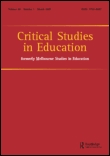
Critical Studies in Education
Scope & Guideline
Challenging conventions, inspiring innovation.
Introduction
Aims and Scopes
- Critical Pedagogy and Social Justice:
The journal focuses on critical pedagogy and its role in promoting social justice within educational contexts. It seeks to explore how educational practices can challenge systemic inequalities and empower marginalized communities. - Policy Analysis and Governance:
A significant emphasis is placed on analyzing educational policies and governance structures. The journal examines how policies affect teaching practices, student experiences, and broader educational outcomes. - Cultural and Contextual Studies:
The journal encourages studies that explore the cultural contexts of education. This includes investigations into how cultural dynamics shape educational practices and the experiences of diverse student populations. - Interdisciplinary Approaches:
Critical Studies in Education promotes interdisciplinary methodologies, drawing from sociology, anthropology, cultural studies, and critical theory to enrich educational research. - Datafication and Technology in Education:
With the growing impact of technology on education, the journal critically examines the role of data and digital platforms in shaping educational experiences and governance.
Trending and Emerging
- Intersectionality in Education:
There is a growing focus on intersectionality, particularly in relation to race, gender, and sexuality. Recent papers emphasize how these intersecting identities affect educational experiences and pedagogical approaches. - Digital and Data Literacy:
With the rise of technology in education, there is an increasing trend towards exploring digital literacy and datafication. This includes critical examinations of how technology shapes learning and educational governance. - Indigenous and Decolonial Education:
Emerging themes around Indigenous education and decolonial practices are gaining traction. The journal highlights the importance of integrating Indigenous perspectives and methodologies in education. - Affective and Emotional Dimensions of Learning:
Recent publications reflect a trend towards exploring the affective and emotional dimensions of education. This includes how emotions influence learning, teaching practices, and educational environments. - Global and Transnational Educational Issues:
There is an increasing interest in global and transnational issues in education, including migration, internationalization, and the implications of global policies on local educational contexts.
Declining or Waning
- Traditional Pedagogical Methods:
There seems to be a decline in papers focusing on traditional pedagogical methods, as the journal increasingly prioritizes critical and innovative approaches that challenge conventional practices. - Standardized Testing and Assessment:
The discourse around standardized testing and conventional assessment methods is becoming less frequent. This shift indicates a growing critique of these practices as inadequate measures of educational success. - Neoliberal Education Critiques:
Although critiques of neoliberalism in education remain relevant, the frequency of papers exclusively focused on neoliberal critiques has been decreasing, suggesting a broader exploration of alternative frameworks. - Historical Perspectives on Education:
Papers focusing on historical analyses of education are appearing less often. The journal's current trend shows a preference for contemporary issues and immediate educational challenges. - Teacher Professionalism in Traditional Contexts:
Research centered around traditional notions of teacher professionalism is waning, as the journal increasingly embraces discussions on dynamic and activist forms of professionalism.
Similar Journals

TEACHERS COLLEGE RECORD
Illuminating Contemporary Issues in Teaching and PolicyTeachers College Record is a prestigious academic journal in the field of education, published by SAGE Publications Inc., that has been a leading resource since its inception in 1976. This journal serves as a platform for scholarly articles, research studies, and critical analyses that inform and advance the understanding of educational theory, policy, and practice. With an impressive Scopus Rank placing it at #490 out of 1543 in the Social Sciences - Education category and a Q2 quartile ranking for 2023, it is recognized for its rigorous peer-review process and significant contributions to the field. Researchers, educators, and students can expect to find cutting-edge discussions on contemporary issues, innovative methodologies, and evidence-based practices. Although the journal does not currently offer open access, it remains a vital asset for those dedicated to enhancing educational outcomes and fostering intellectual discourse.
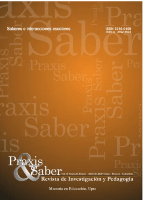
Praxis & Saber
Catalyzing Educational Reform through Empirical StudiesPraxis & Saber is a premier open-access journal published by UNIV PEDAGOGICA & TECNOLOGICA COLOMBIA, featuring a commitment to the dissemination of high-quality research across diverse fields related to education, technology, and pedagogy. Since its inception in 2010, this journal has served as a vital platform for scholars, educators, and practitioners to share innovative ideas and empirical studies that advance pedagogical practices in Colombia and beyond. With its accessible format, Praxis & Saber encourages a global exchange of knowledge and insights, crucial for driving educational reforms and enhancing teaching methodologies. Researchers and professionals can benefit from its rich repository of articles that reflect current trends and challenges in the educational landscape. Whether you are looking to publish your findings or seek inspiration for your work, Praxis & Saber stands out as an essential resource in the academic community.
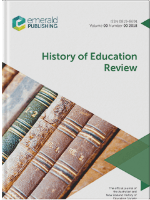
History of Education Review
Charting the Evolution of Learning Through TimeHistory of Education Review is an esteemed academic journal published by Emerald Group Publishing Ltd, specializing in the intersection of education and history. With an ISSN of 0819-8691, this journal provides a critical platform for scholars and practitioners to explore the historical frameworks that have shaped educational practices and policies. Recognized within the top tiers of academic publishing, it is classified as a Q3 journal in Education and a Q1 journal in History for 2023, indicating its significant influence and commitment to scholarly excellence. The journal's Scopus rankings reflect its robust presence in the fields of Arts and Humanities (ranked 321 out of 1760) and Social Sciences (ranked 1159 out of 1543), highlighting its relevance to a diverse scholarly audience. Despite its traditional publishing model, the journal remains vital for those seeking to understand the historical context behind contemporary educational issues. With a rich history of publication dating back to 1980 and ongoing contributions through 2024, the History of Education Review is indispensable for researchers, professionals, and students aiming to deepen their understanding of educational history and its implications for today's educational landscape.

Revista Espanola de Educacion Comparada
Pioneering Comparative Insights in EducationRevista Espanola de Educacion Comparada, published by UNIV NACIONAL EDUCACION DISTANCIA, is a premier academic journal dedicated to the field of education and comparative education, actively contributing to the discourse since its transition to an Open Access format in 1995. Based in Spain, this journal serves as a vital resource for researchers, educators, and policymakers, focusing on the intersection of education, culture, and philosophy. With an impressive Q3 ranking in Education and a stellar Q1 ranking in Philosophy as of 2023, the journal exemplifies rigorous scholarly excellence, reflected in its Scopus rankings, which place it in the top 85th percentile for Philosophy and the 47th percentile for Education. Spanning publication years from 2019 to 2024, it aims to foster innovative ideas and critical discussions, making it an essential read for those invested in advancing educational practices and theoretical frameworks globally.

International Journal of Multicultural Education
Exploring diverse educational landscapes with purpose.The International Journal of Multicultural Education (IJME), published by EASTERN COLL, DEPT EDUCATION, is a leading open-access journal dedicated to advancing the field of multicultural education. Established in 2007, this journal has become an essential platform for researchers, educators, and policymakers interested in exploring the complexities of education in diverse cultural contexts. With an impressive impact factor and strong rankings in multiple categories including Q1 in Anthropology and Cultural Studies, and Q2 in both Education and Social Sciences, the IJME provides high-quality, peer-reviewed articles that contribute to impactful educational practices and scholarship. The journal's open access model ensures that its invaluable research reaches a global audience, fostering dialogue and collaboration among academics, practitioners, and students. By focusing on themes that address social justice, equity, and cultural awareness in education, the IJME plays a critical role in shaping inclusive and effective educational frameworks for the future.

Cultural Studies of Science Education
Bridging Cultures and Science for Educational ExcellenceCultural Studies of Science Education, published by Springer, is a leading journal in the field of cultural studies, with a specific focus on the intersection of science education and cultural analysis. With an ISSN of 1871-1502 and an E-ISSN of 1871-1510, this journal has demonstrated its commitment to high-quality research, evidenced by its impressive Q1 ranking in 2023 within the Cultural Studies category and a notable position in the 93rd percentile in Scopus Ranks for Social Sciences. Covering a wide array of interdisciplinary topics, the journal seeks to advance the understanding of how scientific knowledge and education are shaped by cultural contexts, making it a vital resource for researchers, educators, and policy makers. Operating from the Netherlands, the journal embraces an open access philosophy to ensure that cutting-edge research is accessible to all, fostering collaboration and innovation in the field. As we converge years from 2006 to 2024, Cultural Studies of Science Education continues to explore critical issues and innovative methodologies, aiming to inspire and inform the next generation of scholars and practitioners.
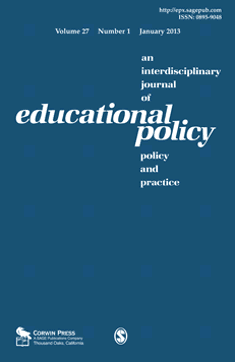
EDUCATIONAL POLICY
Catalyzing Dialogue on Educational PoliciesEDUCATIONAL POLICY, published by SAGE Publications Inc, is a premier journal dedicated to the analysis and discussion of educational policies and their implications within the education sector. With an ISSN of 0895-9048 and an E-ISSN of 1552-3896, this influential journal has been at the forefront of research since its inception in 1987, continuing to provide valuable insights through 2024 and beyond. Ranked in the top quartile (Q1) in the field of Education, as well as achieving a notable Scopus rank of #317 out of 1543 in Social Sciences - Education, EDUCATIONAL POLICY offers a robust platform for researchers, professionals, and students focused on the evolving landscape of educational governance, policy-making, and reform. The journal's commitment to rigorous scholarship ensures that it remains an essential resource for those seeking to understand the complexities of educational systems, making it an indispensable asset for anyone invested in enhancing educational outcomes.
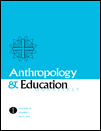
ANTHROPOLOGY & EDUCATION QUARTERLY
Fostering Dialogue Between Disciplines for Transformative EducationANTHROPOLOGY & EDUCATION QUARTERLY, published by Wiley, is a premier journal dedicated to the exploration of the interconnections between anthropology and education. With an impressive impact factor and esteemed recognition as a Q1 journal in both Anthropology and Education, this journal ranks among the top in its fields, sitting at 62nd in Social Sciences - Anthropology and 478th in Social Sciences - Education according to Scopus. Since its inception in 1977, the journal has served as a vital platform for engaging research and scholarship, fostering dialogue among researchers, practitioners, and educators. While no open access options are currently available, the journal provides insightful articles that advance theoretical and practical knowledge, emphasizing the importance of anthropological perspectives in educational contexts. The journal is committed to connecting interdisciplinary scholars and contributing to the ongoing discourse that shapes the future of education and cultural understanding.
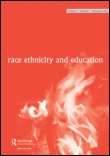
Race Ethnicity and Education
Shaping discourse on race and educational equity.Race Ethnicity and Education is a premier interdisciplinary journal published by Routledge Journals, Taylor & Francis Ltd, dedicated to exploring critical issues at the intersection of race, ethnicity, and educational practices. With an impressive impact factor and distinguished Scopus rankings placing it in the top quartile across categories such as Cultural Studies, Demography, and Education, this journal provides a rich platform for innovative research that addresses the complexities of educational equity and social justice. Since its inception in 1998, the journal has aimed to advance knowledge in these crucial areas, facilitating scholarly dialogue among researchers, educators, and policy makers. With a commitment to disseminating high-quality research, Race Ethnicity and Education plays an essential role in shaping the future of educational discourse, making it a must-read for anyone invested in the fields of education and social justice.
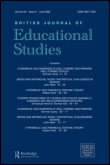
BRITISH JOURNAL OF EDUCATIONAL STUDIES
Fostering Innovation in Education Since 1952.The British Journal of Educational Studies, published by Routledge Journals, Taylor & Francis Ltd, stands as a prominent platform in the field of education, dedicated to advancing scholarly discussions and research since its inception in 1952. With an impressive impact factor and categorization in the Q1 quartile for education, this journal consistently ranks among the top-tier educational publications globally, occupying the 79th percentile in Scopus for Social Sciences - Education. As a vital resource for educational researchers, professionals, and students, it encompasses various aspects of educational theory and practice while fostering a deeper understanding of the social and cultural contexts that shape learning. Though it does not currently offer open access, the journal remains committed to delivering high-quality research articles, reviews, and critical discussions that drive innovation in educational practices and policies. The British Journal of Educational Studies continues to shape the discourse within the educational community, making it an essential read for anyone passionate about the future of education.